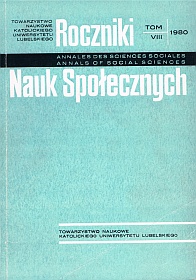The Sociological Motives of Church Membership
Abstract
The article starts by sketching the general situation of the Church and religion in a pluralistic society. In view of gradient Church membership and inner stratification of the Church into groups of people of varying degrees of identification with, or separation from the Church, the question of motives of Church membership becomes a burning one. The problem is discussed in the light of Austrian and West German sociological studies and on the example of one Polish region undergoing industrialization (villages surrounding Płock and rural migrants to Płock). The investigations in the Płock region were carried out in 1976-1977 and involved 295 inhabitants of suburban villages and 179 rural migrants.
Our analysis of the main motives of Church membership makes it possible to draw several broad conclusions. First, as regards the most important motives of Church membership there is no alternative of religious vs. social motives, but an alternative of motives of religious tradition vs. personal religious motives. There is clear priority of religious motives over social ones. Secondly, deep entry (trough migration) into the social reality of an industrialized region results in the appearance of individuals who make a conscious break with the Church and in increase in the number of Catholics who invoke purely social motives to justify their bond with the Church. Thirdly, as regards objective social change, a several-year period of industrialization in a rural area is too short to effect state of religious consciousness that would be tantamount to serious unsettlement of formal Church membership. The Church still commands much loyalty and respect in both urban and rural communities, even among those whose outward attitude towards the Church is quite passive.
Copyright (c) 1980 Roczniki Nauk Społecznych

This work is licensed under a Creative Commons Attribution-NonCommercial-NoDerivatives 4.0 International License.


